北师大版(2019)高中英语选择性必修1 Unit3 Conservation Lesson1The Sixth Extinction课件(35张ppt)
文档属性
| 名称 | 北师大版(2019)高中英语选择性必修1 Unit3 Conservation Lesson1The Sixth Extinction课件(35张ppt) | 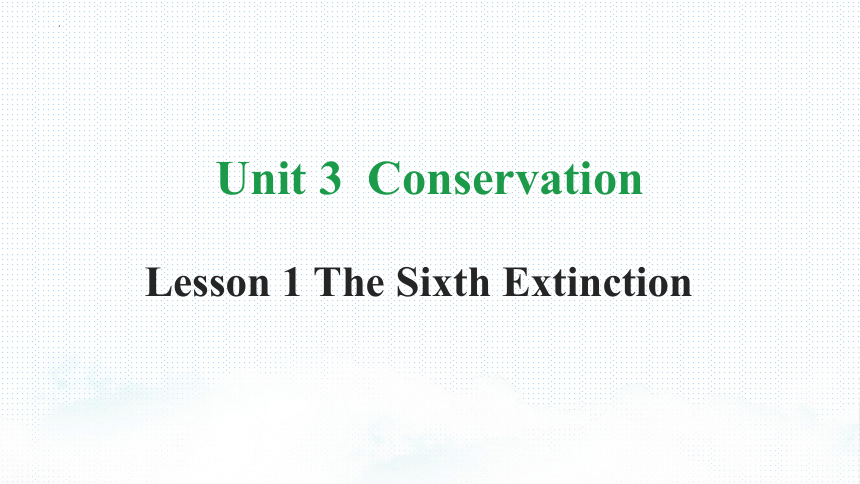 | |
| 格式 | zip | ||
| 文件大小 | 2.3MB | ||
| 资源类型 | 教案 | ||
| 版本资源 | 北师大版(2019) | ||
| 科目 | 英语 | ||
| 更新时间 | 2022-06-18 09:52:56 | ||
图片预览

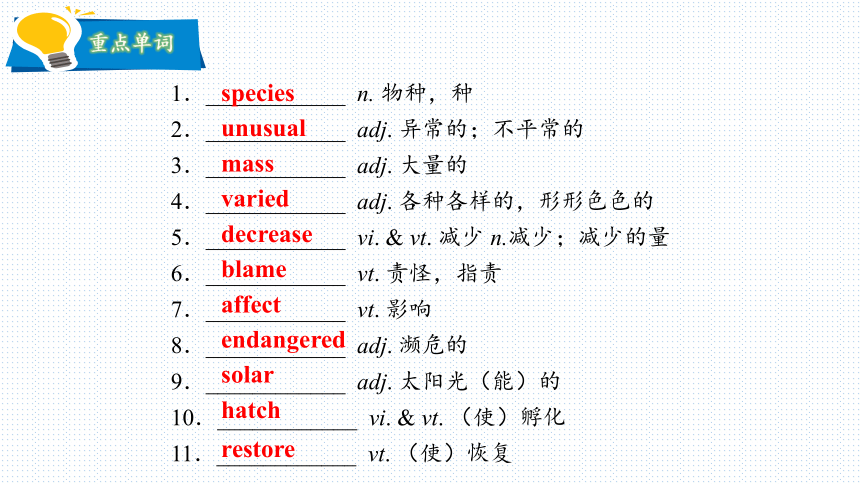
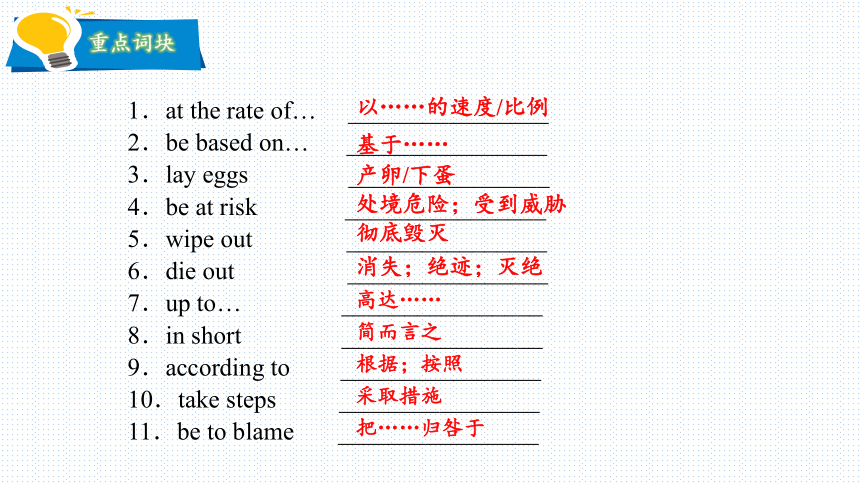
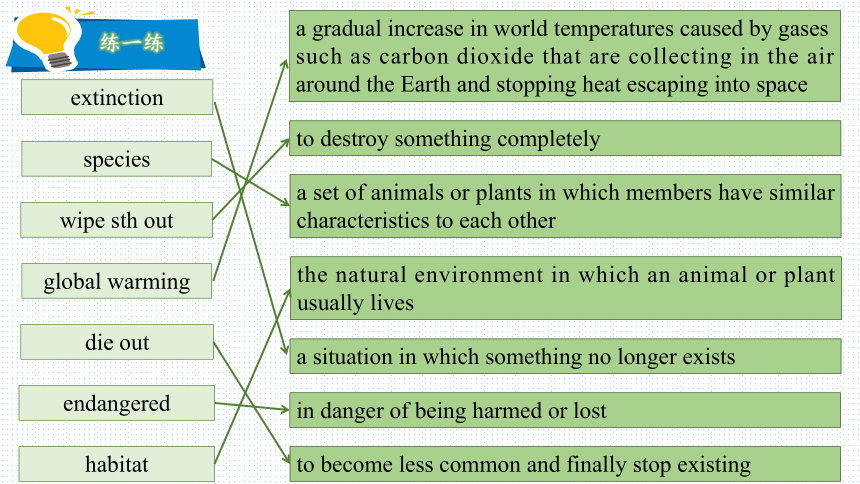
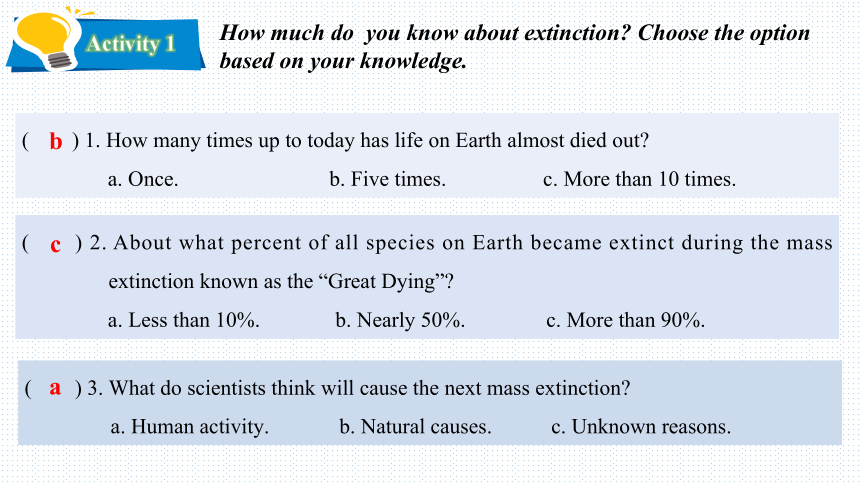
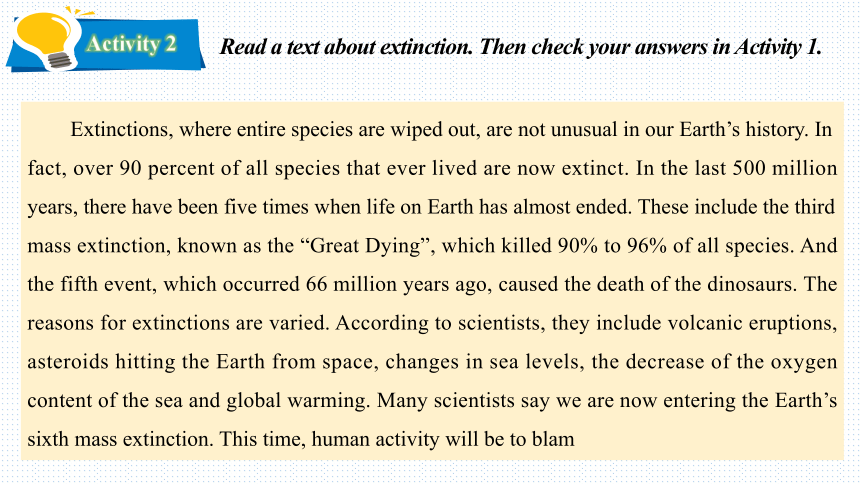
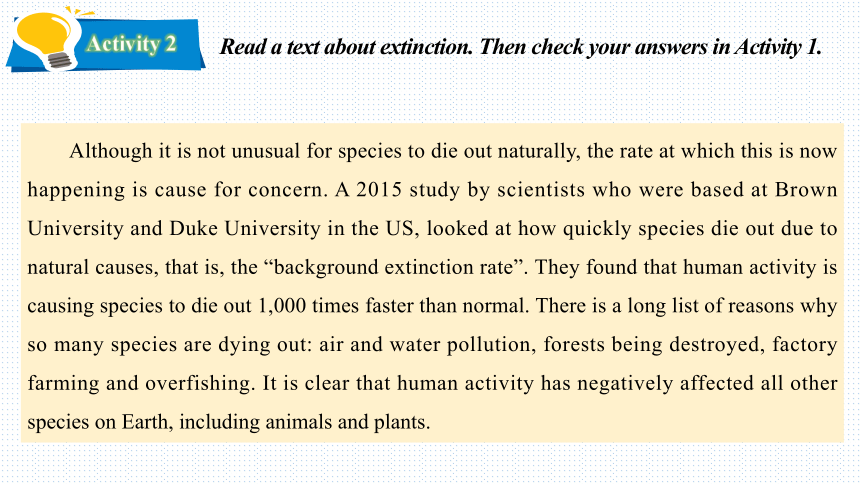
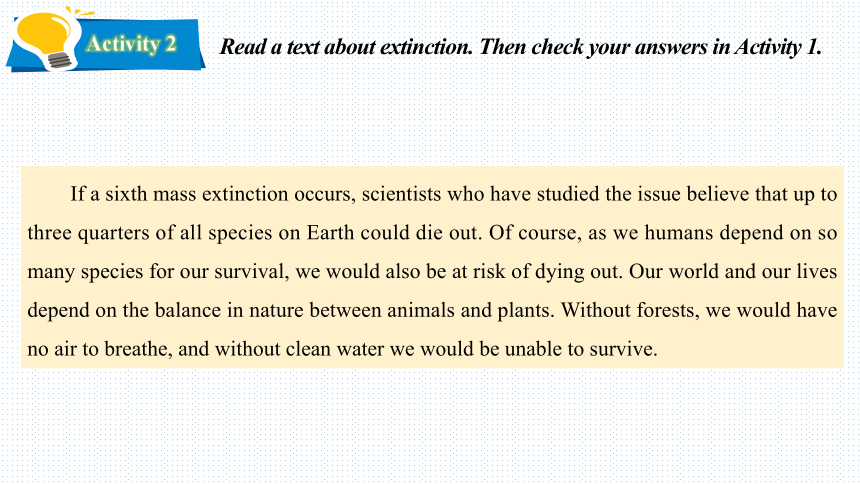
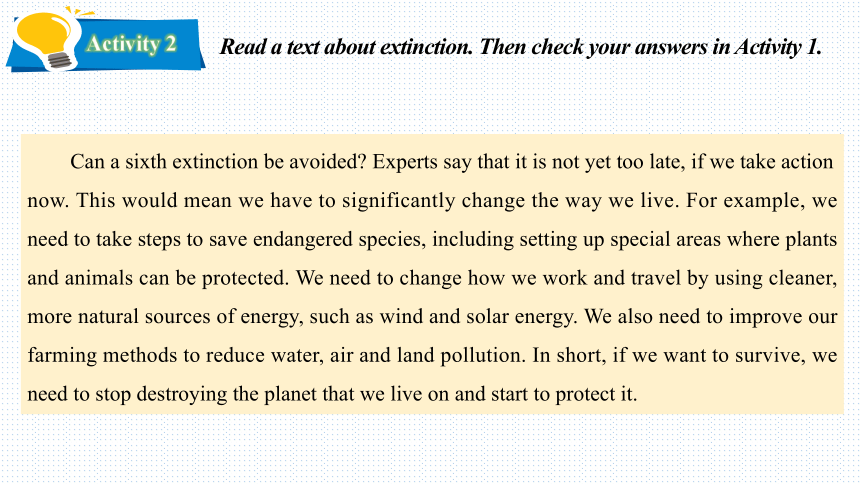
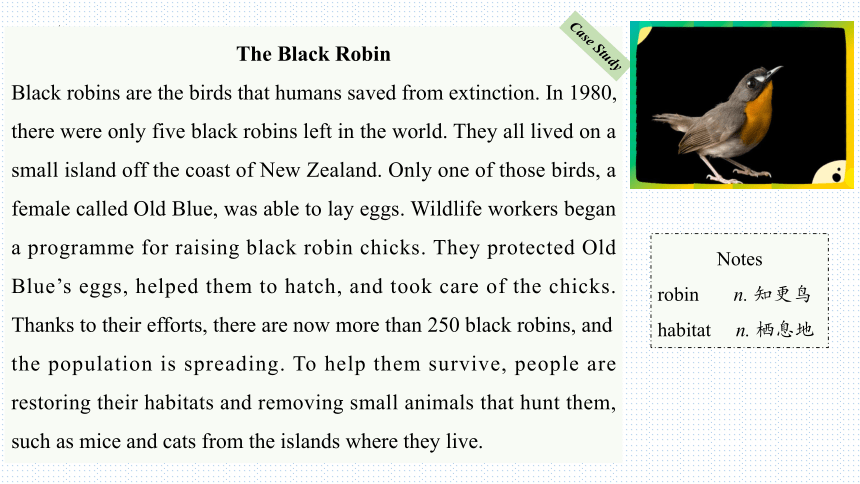
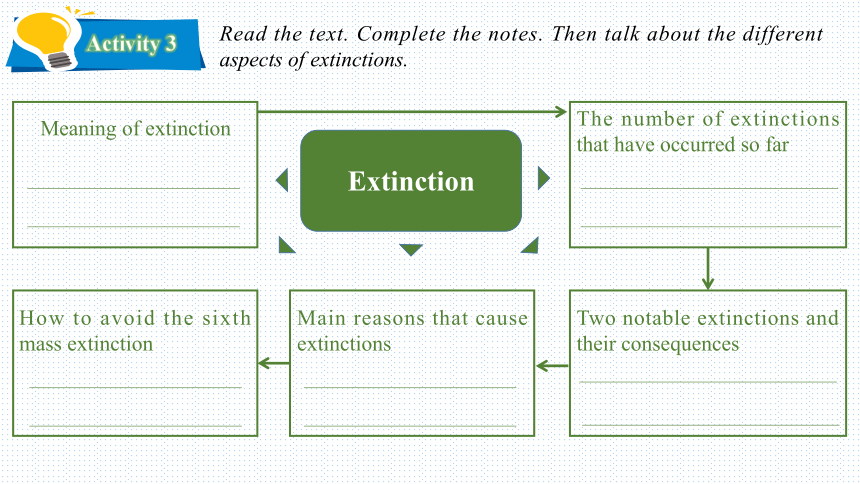
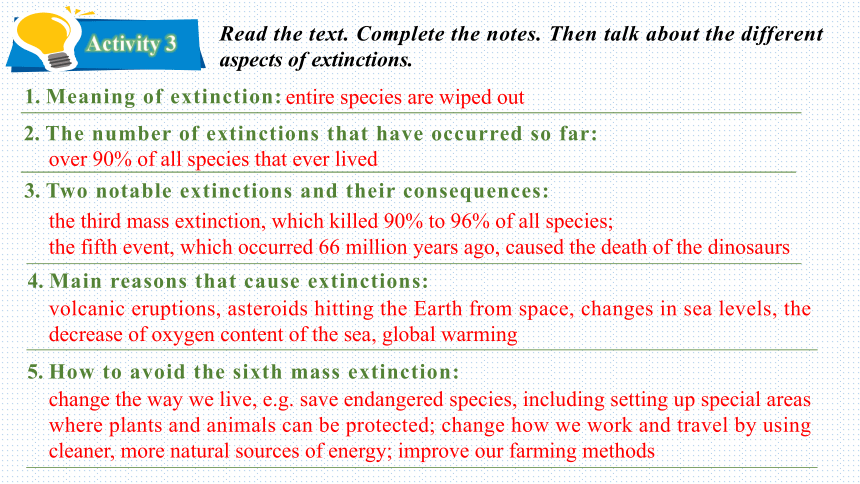
文档简介
(共35张PPT)
Unit 3 Conservation
Lesson 1 The Sixth Extinction
重点单词
1.____________ n. 物种,种
2.____________ adj. 异常的;不平常的
3.____________ adj. 大量的
4.____________ adj. 各种各样的,形形色色的
5.____________ vi. & vt. 减少 n.减少;减少的量
6.____________ vt. 责怪,指责
7.____________ vt. 影响
8.____________ adj. 濒危的
9.____________ adj. 太阳光(能)的
10.____________ vi. & vt. (使)孵化
11.____________ vt. (使)恢复
species
unusual
mass
varied
decrease
blame
affect
endangered
solar
hatch
restore
重点词块
1.at the rate of… ________________
2.be based on… ________________
3.lay eggs ________________
4.be at risk ________________
5.wipe out ________________
6.die out ________________
7.up to… ________________
8.in short ________________
9.according to ________________
10.take steps ________________
11.be to blame ________________
以……的速度/比例
基于……
产卵/下蛋
处境危险;受到威胁
彻底毁灭
消失;绝迹;灭绝
高达……
简而言之
根据;按照
采取措施
把……归咎于
练一练
extinction
species
wipe sth out
global warming
die out
a situation in which something no longer exists
in danger of being harmed or lost
the natural environment in which an animal or plant usually lives
a set of animals or plants in which members have similar characteristics to each other
to destroy something completely
a gradual increase in world temperatures caused by gases such as carbon dioxide that are collecting in the air around the Earth and stopping heat escaping into space
to become less common and finally stop existing
endangered
habitat
( ) 1. How many times up to today has life on Earth almost died out
a. Once. b. Five times. c. More than 10 times.
Activity 1
How much do you know about extinction Choose the option based on your knowledge.
( ) 2. About what percent of all species on Earth became extinct during the mass extinction known as the “Great Dying”
a. Less than 10%. b. Nearly 50%. c. More than 90%.
( ) 3. What do scientists think will cause the next mass extinction
a. Human activity. b. Natural causes. c. Unknown reasons.
b
c
a
Activity 2
Extinctions, where entire species are wiped out, are not unusual in our Earth’s history. In fact, over 90 percent of all species that ever lived are now extinct. In the last 500 million years, there have been five times when life on Earth has almost ended. These include the third mass extinction, known as the “Great Dying”, which killed 90% to 96% of all species. And the fifth event, which occurred 66 million years ago, caused the death of the dinosaurs. The reasons for extinctions are varied. According to scientists, they include volcanic eruptions, asteroids hitting the Earth from space, changes in sea levels, the decrease of the oxygen content of the sea and global warming. Many scientists say we are now entering the Earth’s sixth mass extinction. This time, human activity will be to blam
Read a text about extinction. Then check your answers in Activity 1.
Activity 2
Although it is not unusual for species to die out naturally, the rate at which this is now happening is cause for concern. A 2015 study by scientists who were based at Brown University and Duke University in the US, looked at how quickly species die out due to natural causes, that is, the “background extinction rate”. They found that human activity is causing species to die out 1,000 times faster than normal. There is a long list of reasons why so many species are dying out: air and water pollution, forests being destroyed, factory farming and overfishing. It is clear that human activity has negatively affected all other species on Earth, including animals and plants.
Read a text about extinction. Then check your answers in Activity 1.
Activity 2
If a sixth mass extinction occurs, scientists who have studied the issue believe that up to three quarters of all species on Earth could die out. Of course, as we humans depend on so many species for our survival, we would also be at risk of dying out. Our world and our lives depend on the balance in nature between animals and plants. Without forests, we would have no air to breathe, and without clean water we would be unable to survive.
Read a text about extinction. Then check your answers in Activity 1.
Activity 2
Can a sixth extinction be avoided Experts say that it is not yet too late, if we take action now. This would mean we have to significantly change the way we live. For example, we need to take steps to save endangered species, including setting up special areas where plants and animals can be protected. We need to change how we work and travel by using cleaner, more natural sources of energy, such as wind and solar energy. We also need to improve our farming methods to reduce water, air and land pollution. In short, if we want to survive, we need to stop destroying the planet that we live on and start to protect it.
Read a text about extinction. Then check your answers in Activity 1.
The Black Robin
Black robins are the birds that humans saved from extinction. In 1980, there were only five black robins left in the world. They all lived on a small island off the coast of New Zealand. Only one of those birds, a female called Old Blue, was able to lay eggs. Wildlife workers began a programme for raising black robin chicks. They protected Old Blue’s eggs, helped them to hatch, and took care of the chicks. Thanks to their efforts, there are now more than 250 black robins, and the population is spreading. To help them survive, people are restoring their habitats and removing small animals that hunt them, such as mice and cats from the islands where they live.
Case Study
Notes
robin n. 知更鸟
habitat n. 栖息地
Activity 3
Meaning of extinction
How to avoid the sixth mass extinction
Main reasons that cause extinctions
Two notable extinctions and their consequences
The number of extinctions that have occurred so far
Extinction
Read the plete the notes. Then talk about the different aspects of extinctions.
1. Meaning of extinction:
entire species are wiped out
over 90% of all species that ever lived
the third mass extinction, which killed 90% to 96% of all species;
the fifth event, which occurred 66 million years ago, caused the death of the dinosaurs
volcanic eruptions, asteroids hitting the Earth from space, changes in sea levels, the decrease of oxygen content of the sea, global warming
3. Two notable extinctions and their consequences:
4. Main reasons that cause extinctions:
2. The number of extinctions that have occurred so far:
Activity 3
change the way we live, e.g. save endangered species, including setting up special areas where plants and animals can be protected; change how we work and travel by using cleaner, more natural sources of energy; improve our farming methods
5. How to avoid the sixth mass extinction:
Read the plete the notes. Then talk about the different aspects of extinctions.
1. What did scientists find out in 2015
The study found how quickly species die out due to natural causes, that is the “background extinction rate”. They found that human activity is causing species to die out 1,000 times faster than normal.
Because human activity has negatively affected all other species on Earth, including animals and plants.
2. Why does the writer think the sixth mass extinction will come
Activity 4
Read again. Answer the questions.
Because our world and our lives depend on the balance in nature between animals and plants.
3. Why does the writer believe we’ll probably die out if 75% of the Earth’s species die out
Activity 4
People protected Old Blue’s eggs, helped them to hatch, and took care of the chicks. People are restoring their habitats and removing pests like mice and cats from the islands where they live. The case study showed that even in desperate situations, we can do something to help. In short, it’s never too late.
4. What did people do in the case study to protect black robins Which claim(s) did the case study support in the text
Read again. Answer the questions.
In the last 500 million years, there have been five mass extinction events on Earth. In the third event, which 1. __________ the “Great Dying”, 90% to 96% of all species 2. _________. Of course, species died out due to many causes. But nowadays, human activity 3. ___________ all types of species that we 4. ___________ for living. We need to 5. ___________ to avoid the sixth mass extinction. We should 6. __________ to save endangered animals and plants, and 7. _______ special areas to 8. ___________ them before the next extinction comes that may 9. _________ the entire species.
Activity 7
die out be known as have affected depend on wipe out
take steps take action set up take care of
Complete the paragraph about extinctions using the correct form of the phrases below.
is known as
died out
has affected
depend on
take action
take steps
set up
take care of
wipe out
Activity 8
Read the sentences and discuss which word(s) the clauses (in italics) refer to.
1. Extinctions, where entire species are wiped out, are not unusual in our Earth’s
history.
“where entire species are wiped out” refers to “Extinctions”
2. These include the third mass extinction, known as the “Great Dying”, which
killed 90% to 96% of all species.
“which killed 90% to 96% of all species” refers to the “Great Dying”
3. A 2015 study by scientists who were based at Brown University and Duke
University in the US, looked at how quickly species die out due to natural
causes...
“who were based at Brown University and Duke University in the US” refers to “scientists”
Activity 8
Read the sentences and discuss which word(s) the clauses (in italics) refer to.
4. If a sixth mass extinction occurs, scientists who have studied the issue believe that up to three quarters of all species on Earth could die out.
“who have studied the issue” refers to “scientists”
5. We need to take steps to save endangered species, including setting up special areas where plants and animals can be protected.
“where plants and animals can be protected” refers to “special areas”
Which of the clauses above:
(1) give information to identify the persons / objects. (_____________)
(2) give extra information about a person or a thing, which can be left out.
(________________)
Focus on language: Relative clauses—Defining clause and Non-defining clause
defining clause
non-defining clause
用法(1):彻底消灭,全部摧毁(具体的物品)
例句1. The disease threatens to wipe out the entire population.
这种疾病有可能毁灭整个种群。
仿写:A volcanic eruption nearly _______________________ of Montserrat in 1997.
1997年的一次火山喷发差点把蒙特塞拉特这个小岛给毁灭了。
用法(2):去除,抹去(抽象的东西)
例句2. I really hope surgery could wipe out the tired feelings.
我真的希望手术可以去除这些疲劳的感觉。
仿写:A disease has ________________________.
一场疾病把他所有的记忆都抹去了。
词汇精讲
(P52) Extinctions, where entire species are wiped out, are not unusual in our Earth’s history.
物种灭绝,即整个物种的完全消失,在地球历史上并不罕见。
1.wipe out 彻底毁灭
wiped out the small island
wiped out all his memories
用法(1):It is unusual (for sb.) to do sth. 做某事对某人来说是不寻常的
例句1. It’s unusual for him to feel very angry in a situation like this.
在像这样的情况下,他大发雷霆是不寻常的。
词汇精讲
(P52) Extinctions, where entire species are wiped out, are not unusual in our Earth’s history.
物种灭绝,即整个物种的完全消失,在地球历史上并不罕见。
2.unusual adj. 异常的;不平常的
用法(2):It is unusual that sb. do sth. 某人做某事是不寻常的
例句2. It is not unusual that she reaches out her helping hand.
她经常出手相助。
【词汇拓展】
unusually adv. 不寻常地 usual adj. 通常的 usually adv. 通常地
than usual 比平时 as usual 像平常那样
词汇精讲
2.unusual adj. 异常的;不平常的
【针对练习】 单句语法填空
(1) Chopsticks are _________ (usual) two long, thin pieces of wood or bamboo. They can also
be made of plastic, animal bone or metal.
(2) This time, we stayed together, in case anything else _________ (usual) happened.
(3) But a few days ago, this ancient town was __________ (usual) full of people.
(4) He was an _________ (usual) man with great business talents.
usually
unusual
unusually
unusual
词汇精讲
(P52) The reasons for extinctions are varied.
物种灭绝的原因多种多样。
3.varied adj. 各种各样的,形形色色的
【词汇拓展】
vary vi.(根据情况)变化,改变;(大小、形状等)相异,不同
vary with… 随……而变化
vary from… 不同于……
vary in… 在……方面不同/有差异
vary from…to… 从……到……不等/不同
【语言提升】varied adj.不同的,多变的,各种各样的,形形色色的(=various)
词汇精讲
【针对练习】 单句语法填空
(1) The three groups of violinists ________ (vary) a lot in their practice times last month.
(2) In 2020, World Wildlife Day celebrated biodiversity, including wild fauna and flora, in all its ________ (vary) and beautiful forms.
(3) I like reading books very much, especially storybooks, varying from Chinese stories ________ English stories.
(4) Changes in price normally vary ________ changes of supply and need.
(5) Though Lucy and Lily are twins, they vary ________ character.
varied
3.varied adj. 各种各样的,形形色色的
varied
to
with
in
(P52) Although it is not unusual for species to die out naturally, the rate at which this is now
happening is cause for concern.
虽然物种的自然灭绝并不罕见,但现在灭绝的速度令人担忧。
4.die out 消失;绝迹,灭绝
【词汇拓展】
die off 相继死去,先后死去
die down 逐渐变弱,逐渐平息
die from/of 死于……
die away 逐渐减弱,逐渐消失
be dying for sth./to do sth. 渴望某物/做某事
词汇精讲
词汇精讲
【针对练习】 单句语法填空
(1) The prey species they directly attack will die ________.
(2) In 2016, just over 400,000 people died ________ the disease.
(3) I am dying ________ a glass of water.
(4) The wind will die ________ in the evening.
(5) So far worldwide, it is reported that more than 90,000 people have been infected with the new coronavirus and more than 3,000 have died ________ less than three months.
out
from
in
down
4.die out 消失;绝迹,灭绝
for
重点句式
1. (P52) In the last 500 million years, __________________ five times when life on Earth has almost ended.
在过去的5亿年里,曾经有5次地球上的生命几乎灭绝了。
2. (P53) ________________ human activity has negatively affected all other species on Earth, including animals and plants.
很明显,人类活动对地球上所有其他物种,包括动物和植物都产生了负面影响。
3. (P53) Without forest, we ____________ no air to breathe.
没有森林,我们就没有呼吸的空气。
there have been
would have
It is clear that
句式精讲
1. (P52) In the last 500 million years, there have been five times when life on Earth has almost ended.
在过去的5亿年里,曾经有5次地球上的生命几乎灭绝了。
there be句型的用法:
(1)本句是there be句型的现在完成时。there be结构中的be动词可以根据具体情况,有
一般现在时、一般过去时、一般将来时、be going to结构、used to结构等。
例句1. There used to be a tower by the river.
河边曾经有一座塔。
例句2. There will be heavy snow next week according to weather report.
根据天气预报,下周将有大雪。
1.there be句型的用法
句式精讲
(2)there be结构还可以根据具体的情况,与同情态动词或seem,happen,remain等连用。
例句3. There must be someone to meet you when you arrive.
你到了后,一定会有人接你的。
例句4. There seems to be someone crying in the next room.
似乎隔壁有人在哭。
(3)there be句型中,be动词有时可用lie,stand,live,exist等替换,表示某个时候或某地有某物。
例句5. On the southwest frontier of China, there lie many forests where live a great variety of plants and animals.
在中国西南边陲有许多森林,那里生长着各种各样的植物和动物。
例句6. There exists an argument about the arrangement for the holidays.
关于度假的安排之事还存在争论。
1.there be句型的用法
句式精讲
(P53) It is clear that human activity has negatively affected all other species on Earth, including animals and plants.
很明显,人类活动对地球上所有其他物种,包括动物和植物都产生了负面影响。
【句式剖析】
本句中的It是一个形式主语。其后接的is clear是一个系表结构。后面的that从句在句中作真正的主语。
(1) 在这个结构中,that从句的谓语部分通常是“should+动词原形”。
例句1. It is necessary that you should behave well at school.
在学校你应该表现好一点。
2.it is+形容词(表语)+that从句(真正的主语)
it is+形容词(表语)+that从句(真正的主语)句式用法:
句式精讲
2.it is+形容词(表语)+that从句(真正的主语)
(2)这句型中的表语,除了是形容词外,还可以是名词。
例句2. It is your duty that you should take good care of your parents.
照顾好你的父母是你的职责。
(3)这个句型中的that从句可以转换成动词不定式短语for sb. to do sth. 。
例句3. It is impossible that they should have finished so much work in such a short time.
=It is impossible for them to have finished so much work in such a short time.
他们在这么短的时间内完成这么多的工作是不可能的。
句式精讲
(P53) Without forest, we would have no air to breathe.
没有森林,我们就没有呼吸的空气。
【句式剖析】
本句的介词without引出的条件是一个假设的条件,句子的谓语动词这时用虚拟语气。
(1)与现在事实相反;
谓语部分:would/could/might (not) do sth.
例句1. Without air, man couldn’t exist on the earth.
没有空气的话,人类将不能在地球上生存。
3.without引导的虚拟语气
without引导虚拟条件时,谓语动词要使用虚拟语气。这时,谓语动词有如下三种形式:
句式精讲
(2)与过去事实相反;
谓语部分:would/could/might (not) have done sth.
例句2. Without your help, I would have failed the exam last week.
没有你帮助的话,我上周考试可能就通不过了。
3.without引导的虚拟语气
(3)与将来事实相反;
谓语动词:would/could/might (not) do sth.
例句3. Without your ticket, I wouldn’t be able to go to the concert tomorrow.
要是没有你的票的话,我明天就不能去听音乐会了。
课后练习
Ⅰ.判断正误
( ) 1. In the last fifty million years, life on earth has almost died out.
( ) 2. Human activities are to blame for the previous life extinction.
( ) 3. Human activities have so far negatively affected life on the earth.
( ) 4. Life will almost die out in the sixth mass extinction.
( ) 5. Our world and our lives depend on the balance in nature between animals and plants.
F
F
T
T
T
Ⅱ.阅读理解
( ) 1.Why does the author mention the extinctions in history in the first paragraph
A. To show us the terrible disasters for mankind.
B. To tell us the climate’s impact on wildlife.
C. To introduce the topic of this text to the readers.
D. To warn us of the potential disasters to mankind.
( ) 2.What worries us most according to the author
A. The destruction of our habitats.
B. The rapid progress of life extinction.
C. The environmental pollution.
D. The imbalance of nature.
C
B
Ⅱ.阅读理解
( ) 3.What can we infer from the third paragraph
A. Human beings are closely related to nature.
B. Most living things will die out in the future.
C. No forest will exist on the earth in the future.
D. Oxygen will soon disappear on the earth.
( ) 4.What does the author intend to do in the last paragraph
A. To show us what to do to avoid the sixth distinction.
B. To tell us what to do to conserve our environment.
C. To encourage us to save more energy in our life.
D. To explain why to protect the natural environment.
A
A
Thank You
Unit 3 Conservation
Lesson 1 The Sixth Extinction
重点单词
1.____________ n. 物种,种
2.____________ adj. 异常的;不平常的
3.____________ adj. 大量的
4.____________ adj. 各种各样的,形形色色的
5.____________ vi. & vt. 减少 n.减少;减少的量
6.____________ vt. 责怪,指责
7.____________ vt. 影响
8.____________ adj. 濒危的
9.____________ adj. 太阳光(能)的
10.____________ vi. & vt. (使)孵化
11.____________ vt. (使)恢复
species
unusual
mass
varied
decrease
blame
affect
endangered
solar
hatch
restore
重点词块
1.at the rate of… ________________
2.be based on… ________________
3.lay eggs ________________
4.be at risk ________________
5.wipe out ________________
6.die out ________________
7.up to… ________________
8.in short ________________
9.according to ________________
10.take steps ________________
11.be to blame ________________
以……的速度/比例
基于……
产卵/下蛋
处境危险;受到威胁
彻底毁灭
消失;绝迹;灭绝
高达……
简而言之
根据;按照
采取措施
把……归咎于
练一练
extinction
species
wipe sth out
global warming
die out
a situation in which something no longer exists
in danger of being harmed or lost
the natural environment in which an animal or plant usually lives
a set of animals or plants in which members have similar characteristics to each other
to destroy something completely
a gradual increase in world temperatures caused by gases such as carbon dioxide that are collecting in the air around the Earth and stopping heat escaping into space
to become less common and finally stop existing
endangered
habitat
( ) 1. How many times up to today has life on Earth almost died out
a. Once. b. Five times. c. More than 10 times.
Activity 1
How much do you know about extinction Choose the option based on your knowledge.
( ) 2. About what percent of all species on Earth became extinct during the mass extinction known as the “Great Dying”
a. Less than 10%. b. Nearly 50%. c. More than 90%.
( ) 3. What do scientists think will cause the next mass extinction
a. Human activity. b. Natural causes. c. Unknown reasons.
b
c
a
Activity 2
Extinctions, where entire species are wiped out, are not unusual in our Earth’s history. In fact, over 90 percent of all species that ever lived are now extinct. In the last 500 million years, there have been five times when life on Earth has almost ended. These include the third mass extinction, known as the “Great Dying”, which killed 90% to 96% of all species. And the fifth event, which occurred 66 million years ago, caused the death of the dinosaurs. The reasons for extinctions are varied. According to scientists, they include volcanic eruptions, asteroids hitting the Earth from space, changes in sea levels, the decrease of the oxygen content of the sea and global warming. Many scientists say we are now entering the Earth’s sixth mass extinction. This time, human activity will be to blam
Read a text about extinction. Then check your answers in Activity 1.
Activity 2
Although it is not unusual for species to die out naturally, the rate at which this is now happening is cause for concern. A 2015 study by scientists who were based at Brown University and Duke University in the US, looked at how quickly species die out due to natural causes, that is, the “background extinction rate”. They found that human activity is causing species to die out 1,000 times faster than normal. There is a long list of reasons why so many species are dying out: air and water pollution, forests being destroyed, factory farming and overfishing. It is clear that human activity has negatively affected all other species on Earth, including animals and plants.
Read a text about extinction. Then check your answers in Activity 1.
Activity 2
If a sixth mass extinction occurs, scientists who have studied the issue believe that up to three quarters of all species on Earth could die out. Of course, as we humans depend on so many species for our survival, we would also be at risk of dying out. Our world and our lives depend on the balance in nature between animals and plants. Without forests, we would have no air to breathe, and without clean water we would be unable to survive.
Read a text about extinction. Then check your answers in Activity 1.
Activity 2
Can a sixth extinction be avoided Experts say that it is not yet too late, if we take action now. This would mean we have to significantly change the way we live. For example, we need to take steps to save endangered species, including setting up special areas where plants and animals can be protected. We need to change how we work and travel by using cleaner, more natural sources of energy, such as wind and solar energy. We also need to improve our farming methods to reduce water, air and land pollution. In short, if we want to survive, we need to stop destroying the planet that we live on and start to protect it.
Read a text about extinction. Then check your answers in Activity 1.
The Black Robin
Black robins are the birds that humans saved from extinction. In 1980, there were only five black robins left in the world. They all lived on a small island off the coast of New Zealand. Only one of those birds, a female called Old Blue, was able to lay eggs. Wildlife workers began a programme for raising black robin chicks. They protected Old Blue’s eggs, helped them to hatch, and took care of the chicks. Thanks to their efforts, there are now more than 250 black robins, and the population is spreading. To help them survive, people are restoring their habitats and removing small animals that hunt them, such as mice and cats from the islands where they live.
Case Study
Notes
robin n. 知更鸟
habitat n. 栖息地
Activity 3
Meaning of extinction
How to avoid the sixth mass extinction
Main reasons that cause extinctions
Two notable extinctions and their consequences
The number of extinctions that have occurred so far
Extinction
Read the plete the notes. Then talk about the different aspects of extinctions.
1. Meaning of extinction:
entire species are wiped out
over 90% of all species that ever lived
the third mass extinction, which killed 90% to 96% of all species;
the fifth event, which occurred 66 million years ago, caused the death of the dinosaurs
volcanic eruptions, asteroids hitting the Earth from space, changes in sea levels, the decrease of oxygen content of the sea, global warming
3. Two notable extinctions and their consequences:
4. Main reasons that cause extinctions:
2. The number of extinctions that have occurred so far:
Activity 3
change the way we live, e.g. save endangered species, including setting up special areas where plants and animals can be protected; change how we work and travel by using cleaner, more natural sources of energy; improve our farming methods
5. How to avoid the sixth mass extinction:
Read the plete the notes. Then talk about the different aspects of extinctions.
1. What did scientists find out in 2015
The study found how quickly species die out due to natural causes, that is the “background extinction rate”. They found that human activity is causing species to die out 1,000 times faster than normal.
Because human activity has negatively affected all other species on Earth, including animals and plants.
2. Why does the writer think the sixth mass extinction will come
Activity 4
Read again. Answer the questions.
Because our world and our lives depend on the balance in nature between animals and plants.
3. Why does the writer believe we’ll probably die out if 75% of the Earth’s species die out
Activity 4
People protected Old Blue’s eggs, helped them to hatch, and took care of the chicks. People are restoring their habitats and removing pests like mice and cats from the islands where they live. The case study showed that even in desperate situations, we can do something to help. In short, it’s never too late.
4. What did people do in the case study to protect black robins Which claim(s) did the case study support in the text
Read again. Answer the questions.
In the last 500 million years, there have been five mass extinction events on Earth. In the third event, which 1. __________ the “Great Dying”, 90% to 96% of all species 2. _________. Of course, species died out due to many causes. But nowadays, human activity 3. ___________ all types of species that we 4. ___________ for living. We need to 5. ___________ to avoid the sixth mass extinction. We should 6. __________ to save endangered animals and plants, and 7. _______ special areas to 8. ___________ them before the next extinction comes that may 9. _________ the entire species.
Activity 7
die out be known as have affected depend on wipe out
take steps take action set up take care of
Complete the paragraph about extinctions using the correct form of the phrases below.
is known as
died out
has affected
depend on
take action
take steps
set up
take care of
wipe out
Activity 8
Read the sentences and discuss which word(s) the clauses (in italics) refer to.
1. Extinctions, where entire species are wiped out, are not unusual in our Earth’s
history.
“where entire species are wiped out” refers to “Extinctions”
2. These include the third mass extinction, known as the “Great Dying”, which
killed 90% to 96% of all species.
“which killed 90% to 96% of all species” refers to the “Great Dying”
3. A 2015 study by scientists who were based at Brown University and Duke
University in the US, looked at how quickly species die out due to natural
causes...
“who were based at Brown University and Duke University in the US” refers to “scientists”
Activity 8
Read the sentences and discuss which word(s) the clauses (in italics) refer to.
4. If a sixth mass extinction occurs, scientists who have studied the issue believe that up to three quarters of all species on Earth could die out.
“who have studied the issue” refers to “scientists”
5. We need to take steps to save endangered species, including setting up special areas where plants and animals can be protected.
“where plants and animals can be protected” refers to “special areas”
Which of the clauses above:
(1) give information to identify the persons / objects. (_____________)
(2) give extra information about a person or a thing, which can be left out.
(________________)
Focus on language: Relative clauses—Defining clause and Non-defining clause
defining clause
non-defining clause
用法(1):彻底消灭,全部摧毁(具体的物品)
例句1. The disease threatens to wipe out the entire population.
这种疾病有可能毁灭整个种群。
仿写:A volcanic eruption nearly _______________________ of Montserrat in 1997.
1997年的一次火山喷发差点把蒙特塞拉特这个小岛给毁灭了。
用法(2):去除,抹去(抽象的东西)
例句2. I really hope surgery could wipe out the tired feelings.
我真的希望手术可以去除这些疲劳的感觉。
仿写:A disease has ________________________.
一场疾病把他所有的记忆都抹去了。
词汇精讲
(P52) Extinctions, where entire species are wiped out, are not unusual in our Earth’s history.
物种灭绝,即整个物种的完全消失,在地球历史上并不罕见。
1.wipe out 彻底毁灭
wiped out the small island
wiped out all his memories
用法(1):It is unusual (for sb.) to do sth. 做某事对某人来说是不寻常的
例句1. It’s unusual for him to feel very angry in a situation like this.
在像这样的情况下,他大发雷霆是不寻常的。
词汇精讲
(P52) Extinctions, where entire species are wiped out, are not unusual in our Earth’s history.
物种灭绝,即整个物种的完全消失,在地球历史上并不罕见。
2.unusual adj. 异常的;不平常的
用法(2):It is unusual that sb. do sth. 某人做某事是不寻常的
例句2. It is not unusual that she reaches out her helping hand.
她经常出手相助。
【词汇拓展】
unusually adv. 不寻常地 usual adj. 通常的 usually adv. 通常地
than usual 比平时 as usual 像平常那样
词汇精讲
2.unusual adj. 异常的;不平常的
【针对练习】 单句语法填空
(1) Chopsticks are _________ (usual) two long, thin pieces of wood or bamboo. They can also
be made of plastic, animal bone or metal.
(2) This time, we stayed together, in case anything else _________ (usual) happened.
(3) But a few days ago, this ancient town was __________ (usual) full of people.
(4) He was an _________ (usual) man with great business talents.
usually
unusual
unusually
unusual
词汇精讲
(P52) The reasons for extinctions are varied.
物种灭绝的原因多种多样。
3.varied adj. 各种各样的,形形色色的
【词汇拓展】
vary vi.(根据情况)变化,改变;(大小、形状等)相异,不同
vary with… 随……而变化
vary from… 不同于……
vary in… 在……方面不同/有差异
vary from…to… 从……到……不等/不同
【语言提升】varied adj.不同的,多变的,各种各样的,形形色色的(=various)
词汇精讲
【针对练习】 单句语法填空
(1) The three groups of violinists ________ (vary) a lot in their practice times last month.
(2) In 2020, World Wildlife Day celebrated biodiversity, including wild fauna and flora, in all its ________ (vary) and beautiful forms.
(3) I like reading books very much, especially storybooks, varying from Chinese stories ________ English stories.
(4) Changes in price normally vary ________ changes of supply and need.
(5) Though Lucy and Lily are twins, they vary ________ character.
varied
3.varied adj. 各种各样的,形形色色的
varied
to
with
in
(P52) Although it is not unusual for species to die out naturally, the rate at which this is now
happening is cause for concern.
虽然物种的自然灭绝并不罕见,但现在灭绝的速度令人担忧。
4.die out 消失;绝迹,灭绝
【词汇拓展】
die off 相继死去,先后死去
die down 逐渐变弱,逐渐平息
die from/of 死于……
die away 逐渐减弱,逐渐消失
be dying for sth./to do sth. 渴望某物/做某事
词汇精讲
词汇精讲
【针对练习】 单句语法填空
(1) The prey species they directly attack will die ________.
(2) In 2016, just over 400,000 people died ________ the disease.
(3) I am dying ________ a glass of water.
(4) The wind will die ________ in the evening.
(5) So far worldwide, it is reported that more than 90,000 people have been infected with the new coronavirus and more than 3,000 have died ________ less than three months.
out
from
in
down
4.die out 消失;绝迹,灭绝
for
重点句式
1. (P52) In the last 500 million years, __________________ five times when life on Earth has almost ended.
在过去的5亿年里,曾经有5次地球上的生命几乎灭绝了。
2. (P53) ________________ human activity has negatively affected all other species on Earth, including animals and plants.
很明显,人类活动对地球上所有其他物种,包括动物和植物都产生了负面影响。
3. (P53) Without forest, we ____________ no air to breathe.
没有森林,我们就没有呼吸的空气。
there have been
would have
It is clear that
句式精讲
1. (P52) In the last 500 million years, there have been five times when life on Earth has almost ended.
在过去的5亿年里,曾经有5次地球上的生命几乎灭绝了。
there be句型的用法:
(1)本句是there be句型的现在完成时。there be结构中的be动词可以根据具体情况,有
一般现在时、一般过去时、一般将来时、be going to结构、used to结构等。
例句1. There used to be a tower by the river.
河边曾经有一座塔。
例句2. There will be heavy snow next week according to weather report.
根据天气预报,下周将有大雪。
1.there be句型的用法
句式精讲
(2)there be结构还可以根据具体的情况,与同情态动词或seem,happen,remain等连用。
例句3. There must be someone to meet you when you arrive.
你到了后,一定会有人接你的。
例句4. There seems to be someone crying in the next room.
似乎隔壁有人在哭。
(3)there be句型中,be动词有时可用lie,stand,live,exist等替换,表示某个时候或某地有某物。
例句5. On the southwest frontier of China, there lie many forests where live a great variety of plants and animals.
在中国西南边陲有许多森林,那里生长着各种各样的植物和动物。
例句6. There exists an argument about the arrangement for the holidays.
关于度假的安排之事还存在争论。
1.there be句型的用法
句式精讲
(P53) It is clear that human activity has negatively affected all other species on Earth, including animals and plants.
很明显,人类活动对地球上所有其他物种,包括动物和植物都产生了负面影响。
【句式剖析】
本句中的It是一个形式主语。其后接的is clear是一个系表结构。后面的that从句在句中作真正的主语。
(1) 在这个结构中,that从句的谓语部分通常是“should+动词原形”。
例句1. It is necessary that you should behave well at school.
在学校你应该表现好一点。
2.it is+形容词(表语)+that从句(真正的主语)
it is+形容词(表语)+that从句(真正的主语)句式用法:
句式精讲
2.it is+形容词(表语)+that从句(真正的主语)
(2)这句型中的表语,除了是形容词外,还可以是名词。
例句2. It is your duty that you should take good care of your parents.
照顾好你的父母是你的职责。
(3)这个句型中的that从句可以转换成动词不定式短语for sb. to do sth. 。
例句3. It is impossible that they should have finished so much work in such a short time.
=It is impossible for them to have finished so much work in such a short time.
他们在这么短的时间内完成这么多的工作是不可能的。
句式精讲
(P53) Without forest, we would have no air to breathe.
没有森林,我们就没有呼吸的空气。
【句式剖析】
本句的介词without引出的条件是一个假设的条件,句子的谓语动词这时用虚拟语气。
(1)与现在事实相反;
谓语部分:would/could/might (not) do sth.
例句1. Without air, man couldn’t exist on the earth.
没有空气的话,人类将不能在地球上生存。
3.without引导的虚拟语气
without引导虚拟条件时,谓语动词要使用虚拟语气。这时,谓语动词有如下三种形式:
句式精讲
(2)与过去事实相反;
谓语部分:would/could/might (not) have done sth.
例句2. Without your help, I would have failed the exam last week.
没有你帮助的话,我上周考试可能就通不过了。
3.without引导的虚拟语气
(3)与将来事实相反;
谓语动词:would/could/might (not) do sth.
例句3. Without your ticket, I wouldn’t be able to go to the concert tomorrow.
要是没有你的票的话,我明天就不能去听音乐会了。
课后练习
Ⅰ.判断正误
( ) 1. In the last fifty million years, life on earth has almost died out.
( ) 2. Human activities are to blame for the previous life extinction.
( ) 3. Human activities have so far negatively affected life on the earth.
( ) 4. Life will almost die out in the sixth mass extinction.
( ) 5. Our world and our lives depend on the balance in nature between animals and plants.
F
F
T
T
T
Ⅱ.阅读理解
( ) 1.Why does the author mention the extinctions in history in the first paragraph
A. To show us the terrible disasters for mankind.
B. To tell us the climate’s impact on wildlife.
C. To introduce the topic of this text to the readers.
D. To warn us of the potential disasters to mankind.
( ) 2.What worries us most according to the author
A. The destruction of our habitats.
B. The rapid progress of life extinction.
C. The environmental pollution.
D. The imbalance of nature.
C
B
Ⅱ.阅读理解
( ) 3.What can we infer from the third paragraph
A. Human beings are closely related to nature.
B. Most living things will die out in the future.
C. No forest will exist on the earth in the future.
D. Oxygen will soon disappear on the earth.
( ) 4.What does the author intend to do in the last paragraph
A. To show us what to do to avoid the sixth distinction.
B. To tell us what to do to conserve our environment.
C. To encourage us to save more energy in our life.
D. To explain why to protect the natural environment.
A
A
Thank You
同课章节目录
- Unit 1 Relationshis
- Lesson 1 Teachers
- Lesson 2 How Do We Like Teachers’ Feedback?
- Lesson 3 So Close,Yet So Fa
- Unit 2 Success
- Lesson 1 Money vs Success
- Lesson 2 Top Five Secrets of Success
- Lesson 3 Getting to the Top
- Unit 3 Conservation
- Lesson 1 The Sixth Extinction
- Lesson 2 War on Plastic Packets
- Lesson 3 The Road to Destruction
